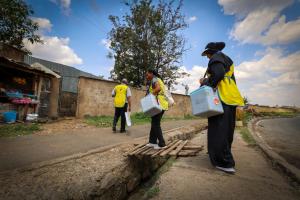Horn of Africa health ministers commit to bolster polio eradication efforts
Brazzaville/Amman/Geneva – For nearly a decade, the Horn of Africa has battled persistent outbreaks of variant poliovirus. Low immunity in children and unmonitored population movement have fuelled poliovirus spread. At a programmatic level, the lack of access to children living in insecure areas, variable levels of national ownership of polio eradication efforts across countries, limited cross-border coordination and delayed responses to outbreaks have allowed continued spread of poliovirus.
However, countries in the Horn are renewing the momentum to end these outbreaks and address this regional crisis. On the sidelines of the World Health Assembly from 19 to 27 May 2025, Ministers of Health from the Horn of Africa and Global Polio Eradication Initiative (GPEI) partners pledged to continue intensifying efforts to end polio in the region. They agreed to establish an inter-ministerial coordination body to galvanize coordinated actions across countries in the region. These efforts include conducting synchronized polio vaccination campaigns, enhancing poliovirus surveillance, particularly along shared borders, and sharing information through efficient coordination mechanisms.
More than 18 million children vaccinated
Already demonstrating strong inter-country coordination, in a critical milestone – and one of the largest vaccination drives in the region, more than 18 million children in Djibouti, Ethiopia, Kenya and Somalia were reached by a synchronized - or coordinated, where it was not possible to synchronize- polio vaccination campaign conducted in two consecutive rounds between February and April 2025.
During the first vaccination drive, which began in Somalia in February and concluded in Ethiopia and Kenya, the three countries shared real-time information on vaccination and poliovirus surveillance, to ensure no pockets of under-immunized children or circulating virus were missed.
Country-level vaccination efforts
Ethiopia has strengthened surveillance and preparedness efforts to prevent further spread. In February, over 15 million children were vaccinated. The campaign launched in the country’s Somali region.
In Kenya, nearly 1 million children, including 10 000 along the border with Ethiopia and Somalia in the first three days alone, were vaccinated in high-risk areas.
Vaccination teams in Somalia travelled from door to door across 76 districts in central and south Somalia and reached 2.4 million out of the targeted 2.5 million children under five years of age with novel oral polio vaccines type 2 (nOPV2). Health workers collaborated closely with counterparts in Ethiopia and Kenya to reach every eligible child living along or crossing the borders.
In Djibouti, more than 155 000 children received polio vaccines in April 2025 in response to detections of variant poliovirus in a child and the environment, and to boost children’s immunity given the high risk of spread in the region.
Mounting a strong search for poliovirus
The region is also reinvigorating efforts to detect poliovirus, particularly in high-risk locations, including by conducting a joint surveillance review across countries in the Horn of Africa. While Kenya has not reported any variant poliovirus cases so far in 2025, the country detected polio-like symptoms - known as acute flaccid paralysis - in healthy children among new arrivals at Kakuma Refugee Camp through ongoing surveillance. Stool samples collected tested negative for poliovirus.
Somalia has continued to combat variant poliovirus circulation since 2017. In 2024, the virus paralyzed seven children, but no cases have been reported so far this year.
Ethiopia is the new hotspot for variant poliovirus type 2 circulation in the Horn of Africa, with variant poliovirus was detected in 44 children last year, reinforcing the urgency of outbreak response efforts.
“The commitment shown by the Horn of African countries in coordinating their polio vaccination efforts reflects the strength of regional solidarity. By working together, we are ensuring that progress toward polio eradication is sustained. WHO and the Global Polio Eradication Initiative remain committed to supporting these countries in their continued fight against polio,” said Dr Chikwe Ihekweazu, Acting WHO Regional Director for Africa.
“Diseases – like polio – don’t recognize borders and hide among vulnerable populations. While we acknowledge the governments and health workers of Somalia, Ethiopia and Kenya, for their strong collaboration, we must recognize we can all do more to ensure no child misses out on polio and other life-saving vaccines – and to intensify efforts to track, trace and stop polio from spreading,” said Dr Hanan Balkhy, WHO Regional Director for the Eastern Mediterranean.
Preparation for the cross-border vaccination drive and collaboration took centre stage during the Horn of Africa Coordination meeting conducted in Kampala in September 2024. WHO, GPEI partners and health representatives from Djibouti, Ethiopia, Kenya, Somalia, Tanzania, Uganda gathered to strengthen cross-border plans and align on priorities.



